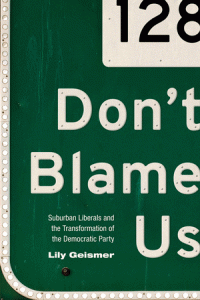 In her new book, Don’t Blame Us: Suburban Liberals and the Transformation of the Democratic Party, Lily Geismer, CMC assistant professor of history, challenges longstanding arguments that the rise of the right and the Reagan Revolution led to the decline of liberalism by looking at
In her new book, Don’t Blame Us: Suburban Liberals and the Transformation of the Democratic Party, Lily Geismer, CMC assistant professor of history, challenges longstanding arguments that the rise of the right and the Reagan Revolution led to the decline of liberalism by looking at
the liberal residents who lived and worked along the high-tech corridor of the Route 128 highway outside Boston.
The book was published by the Princeton University Press as part of its prestigious Politics and Society in Twentieth-Century America series. Nancy MacLean, author of Freedom Is Not Enough: The Opening of the American Workplace, considers Geismer’s study a “must-read for anyone seeking to understand the reinvention of American Liberalism since the 1960s.” The book was also the subject of a recent story in The Boston Globe.
Geismer focused primarily on the communities of Lexington, Concord, Lincoln, Newton and Brookline, and the activities and priorities of the residents there, who she argues have come to represent the new base of the Democratic Party. By probing the possibilities and limitations of these suburban liberals, Geismer shows that as an exception to national trends, the suburbs of Massachusetts offer a model for understanding national political realignment and suburban politics in the second half of the 20th century.
“The growth of suburban liberal politics and support for the Democratic Party in post-industrial, high-tech enclaves across the country proves that Massachusetts holds an influential, but not exceptional, position in national politics,” she says. “Engineers, tech executives, scientists, lawyers, and academics in Silicon Valley college towns like Ann Arbors and the suburbs of many major metropolitan areas from New York to Seattle to Los Angeles, share similar political priorities and voting patterns.”
In the broader spectrum, Geismer’s research (the stories of activism around issues like civil rights, environmentalism, peace, housing and feminism by residents along Route 128) link larger processes to local politics and reinforce the key role of the suburbs in shaping party politics, public policy and structural and racial inequality.
Research for the book relied on archival research both from politicians, state agencies and local organizations and individuals in the suburbs. “One of the most useful sources turned out to be the letters to the editor of local newspapers,” she says.
Prof. Geismer hopes the book will help scholars and the public understand that liberalism and the Democratic Party have not declined since the 1960s, but have changed, becoming increasingly suburban-focused.“There have been key advances and drawbacks to this shift,” she says. “I hope the book will force many people, especially those who live in the suburbs and self-identify as liberal, to think critically about the relationship between their political priorities and their everyday lives.”
##
 Assistant Professor of History Lily Geismer
Assistant Professor of History Lily Geismer
Read Geismer’s recent article “Midterms Matter: The Lessons of the Watergate Babies” in the Fall 2014 issue of CMC Magazine.
